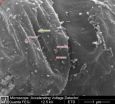(Press-News.org) A new University of British Columbia study identifies an important molecular change that occurs in the brain when we learn and remember.
Published this month in Nature Neuroscience, the research shows that learning stimulates our brain cells in a manner that causes a small fatty acid to attach to delta-catenin, a protein in the brain. This biochemical modification is essential in producing the changes in brain cell connectivity associated with learning, the study finds.
In animal models, the scientists found almost twice the amount of modified delta-catenin in the brain after learning about new environments. While delta-catenin has previously been linked to learning, this study is the first to describe the protein's role in the molecular mechanism behind memory formation.
"More work is needed, but this discovery gives us a much better understanding of the tools our brains use to learn and remember, and provides insight into how these processes become disrupted in neurological diseases," says co-author Shernaz Bamji, an associate professor in UBC's Life Sciences Institute.
It may also provide an explanation for some mental disabilities, the researchers say. People born without the gene have a severe form of mental retardation called Cri-du-chat syndrome, a rare genetic disorder named for the high-pitched cat-like cry of affected infants. Disruption of the delta-catenin gene has also been observed in some patients with schizophrenia.
"Brain activity can change both the structure of this protein, as well as its function," says Stefano Brigidi, first author of the article and a PhD candidate Bamji's laboratory. "When we introduced a mutation that blocked the biochemical modification that occurs in healthy subjects, we abolished the structural changes in brain's cells that are known to be important for memory formation."
INFORMATION:
Background
According to the researchers, more work is needed to fully establish the importance of delta-catenin in building the brain connectivity behind learning and memory. Disruptions to these nerve cell connections are also believed to cause neurodegenerative diseases such as Alzheimer's and Huntington disease. Understanding the biochemical processes that are important for maintaining these connections may help address the abnormalities in nerve cells that occur in these disease states.
New ideas change your brain cells: UBC research
UBC's Shernaz Bamji and Stefano Brigidi have discovered how brain cells change during learning and memories
2014-02-24
ELSE PRESS RELEASES FROM THIS DATE:
Bushfires continue to plague Victoria, Australia
2014-02-24
Reports coming from Australia are more positive than negative now with regards to the Morwell fire, but officials say they still have a "long way to go." Considerable progress has been made in extinguishing the fire, but there is still significant heat that continues to generate smoke from the open mine. Fire activity has been cut in half since February 11, but there are still "weeks of firefighting ahead" according to Craig Lapsley, Fire Services Commissioner on the County Fire Authority website.
According to the Australian News, "The [Morwell] fire, which started ...
Study of Hispanic/Latino health presents initial findings
2014-02-24
February 24, 2014 – (BRONX, NY) –One in every six people in the U.S. is Hispanic/Latino and as a group they live longer than non-Hispanic whites (81.4 years vs. 78.8 years). Yet, despite their strong representation and relative longevity, little is understood about this group's health conditions and behaviors.
The Hispanic Community Health Study/Study of Latinos (HCHS/SOL), the landmark research study of Hispanic/Latino health funded by the National Institutes of Health (NIH), has released initial findings that show significant variations in disease prevalence and health ...
Researcher builds a better job performance review
2014-02-24
MANHATTAN -- A critical job performance evaluation can have a negative effect on any employee, a Kansas State University researcher has found.
By studying how people view positive or negative feedback, Satoris Culbertson, assistant professor of management, has determined that nobody -- even people who are motivated to learn -- likes negative performance reviews. Culbertson is developing ways to help managers improve the process for reviewing employees.
Culbertson and collaborators at Eastern Kentucky University and Texas A&M University surveyed more than 200 staffers ...
Now it will become cheaper to make second-generation biofuel for our cars
2014-02-24
Producing second-generation biofuel from dead plant tissue is environmetally friendly - but it is also expensive because the process as used today needs expensive enzymes, and large companies dominate this market. Now a Danish/Iraqi collaboration presents a new technique that avoids the expensive enzymes. The production of second generation biofuels thus becomes cheaper, probably attracting many more producers and competition, and this may finally bring the price down.
The world's need for fuel will persist, also when the Earth's deposits of fossil fuels run out. Bioethanol, ...
Biomedical bleeding affects horseshoe crab behavior
2014-02-24
DURHAM, N.H. – New research from Plymouth State University and the University of New Hampshire indicates that collecting and bleeding horseshoe crabs for biomedical purposes causes short-term changes in their behavior and physiology that could exacerbate the crabs' population decline in parts of the east coast.
Each year, the U.S. biomedical industry harvests the blue blood from almost half a million living horseshoe crabs for use in pharmaceuticals — most notably, a product called Limulus amebocyte lysate (LAL), used to ensure vaccines and medical equipment are free ...
Significant discrepancies between FISH and IHC results for ALK testing
2014-02-24
DENVER –The findings of a recent study indicate that routine testing with both fluorescent in situ hybridization (FISH) and immunohistochemistry (IHC) may enhance the detection of ALK-positive non-small cell lung cancer (NSCLC). Accurate determination of ALK-positive tumors is necessary to identify patients with advanced NSCLC who are most likely to benefit from targeted therapy with an ALK inhibitor.
The discovery of ALK rearrangement in about 1% to 7% of NSCLCs led to the development of ALK inhibitors, such as crizotinib, which have significantly improved treatment ...
Researchers find flowing water can slow down bacteria
2014-02-24
In a surprising new finding, researchers have discovered that bacterial movement is impeded in flowing water, enhancing the likelihood that the microbes will attach to surfaces. The new work could have implications for the study of marine ecosystems, and for our understanding of how infections take hold in medical devices.
The findings, the result of microscopic analysis of bacteria inside microfluidic devices, were made by MIT postdoc Roberto Rusconi, former MIT postdoc Jeffrey Guasto (now an assistant professor of mechanical engineering at Tufts University), and Roman ...
Tip to dieters: Beware of friends and late night cravings
2014-02-24
There's more to dieting than just sheer willpower and self-control. The presence of friends, late night cravings or the temptation of alcohol can often simply be too strong to resist. Research led by Heather McKee of the University of Birmingham in the UK monitored the social and environmental factors that make people, who are following weight management programs, cheat. The study¹ is published in the Springer journal Annals of Behavioral Medicine.²
Eighty people who were either part of a weight-loss group or were dieting on their own participated in the one-week study. ...
Novel assay developed for detecting ALK rearrangement in NSCLC
2014-02-24
DENVER – Researchers have developed a novel technique for detecting ALK rearrangements in non-small cell lung cancers (NSCLCs) that is more sensitive and easier to perform than currently available techniques. The technique can help enhance the routine practice of diagnostic ALK testing on NSCLCs, which is crucial for identifying patients with advanced NSCLC who are most likely to benefit from targeted therapy with an ALK inhibitor.
None of the current three routine methods used to detect ALK rearrangements in NSCLC is without drawbacks, especially for tissue specimens ...
A fast and effective mechanism to combat an aggressive cancer
2014-02-24
Ovarian cancer accounts for more deaths of American women than any other cancer of the female reproductive system. According to the American Cancer Society, one in 72 American women will be diagnosed with ovarian cancer, and one in 100 will ultimately die of the condition.
Now Prof. Dan Peer of Tel Aviv University's Department of Cell Research and Immunology has proposed a new strategy to tackle an aggressive subtype of ovarian cancer using a new nanoscale drug-delivery system designed to target specific cancer cells. He and his team – Keren Cohen and Rafi Emmanuel from ...
LAST 30 PRESS RELEASES:
Study reveals insights about brain regions linked to OCD, informing potential treatments
Does ocean saltiness influence El Niño?
2026 Young Investigators: ONR celebrates new talent tackling warfighter challenges
Genetics help explain who gets the ‘telltale tingle’ from music, art and literature
Many Americans misunderstand medical aid in dying laws
Researchers publish landmark infectious disease study in ‘Science’
New NSF award supports innovative role-playing game approach to strengthening research security in academia
Kumar named to ACMA Emerging Leaders Program for 2026
AI language models could transform aquatic environmental risk assessment
New isotope tools reveal hidden pathways reshaping the global nitrogen cycle
Study reveals how antibiotic structure controls removal from water using biochar
Why chronic pain lasts longer in women: Immune cells offer clues
Toxic exposure creates epigenetic disease risk over 20 generations
More time spent on social media linked to steroid use intentions among boys and men
New study suggests a “kick it while it’s down” approach to cancer treatment could improve cure rates
Milken Institute, Ann Theodore Foundation launch new grant to support clinical trial for potential sarcoidosis treatment
New strategies boost effectiveness of CAR-NK therapy against cancer
Study: Adolescent cannabis use linked to doubling risk of psychotic and bipolar disorders
Invisible harms: drug-related deaths spike after hurricanes and tropical storms
Adolescent cannabis use and risk of psychotic, bipolar, depressive, and anxiety disorders
Anxiety, depression, and care barriers in adults with intellectual and developmental disabilities
Study: Anxiety, gloom often accompany intellectual deficits
Massage Therapy Foundation awards $300,000 research grant to the University of Denver
Gastrointestinal toxicity linked to targeted cancer therapies in the United States
Countdown to the Bial Award in Biomedicine 2025
Blood marker from dementia research could help track aging across the animal world
Birds change altitude to survive epic journeys across deserts and seas
Here's why you need a backup for the map on your phone
ACS Central Science | Researchers from Insilico Medicine and Lilly publish foundational vision for fully autonomous “Prompt-to-Drug” pharmaceutical R&D
Increasing the number of coronary interventions in patients with acute myocardial infarction does not appear to reduce death rates
[Press-News.org] New ideas change your brain cells: UBC researchUBC's Shernaz Bamji and Stefano Brigidi have discovered how brain cells change during learning and memories



